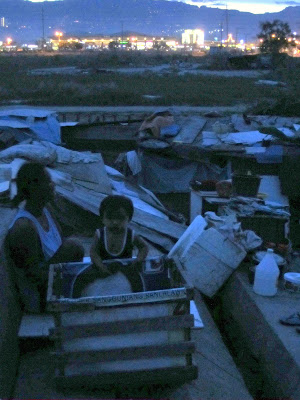It can be very frustrating on both ends. For the owner of the property, and the "squatters" on the property. 180,842 families, or 12.8 percent of the population in my region of the Philippines (The Visayas) are technically squatters (2004 report). And even though the laws are frustrating for my end of the population, that is a huge number of persons who would otherwise be homeless, and the injustice of that, is much more frustrating.
 |
| squatter home with the boats and pier in background |
The team I went with to this area was a Catholic Ministry called SVD who UNICEF has partnered with to do a joint project in providing aid to some of the neediest families. The workers go into these communities weekly and help the families get birth certificates for their children, make sure the children are in school, and try to provide assistance to help the kids stay in school. They also pass out condoms. Because, as you can imagine, sex brings in money. Sometimes more money than scavenging, but not always.
 |
| Lights from shopping district seen behind |
As we walked back towards the city lights in the dusk, two persons heard us and stepped out from behind a structure, hoping we were customers. When they saw who it was they were embarrassed, but the SVD workers didn't even react. They treated them with the same love and dignity they would have treated their family members with.
The definition of trafficking is this: the recruitment, transportation, transfer, harbouring or receipt of persons, by means of the threat or use by force or other forms of coercion, of abduction, of fraud, of deception, of the abuse of power or of a position of vulnerability or of the giving and receiving of payments or benefits to achieve the consent of a person having control over another person, for the purpose of exploitation.
By this definition, anyone who buys these persons, with full knowledge that they have no other means for providing for themselves or their family, is trafficking them.
How does someone get to a place where they believe that their body is only worth a liter of coke? How does someone ever become that desperate? And how do you teach, love, care for, convince, empower or show someone that they are worth more?
They are worth much more.



